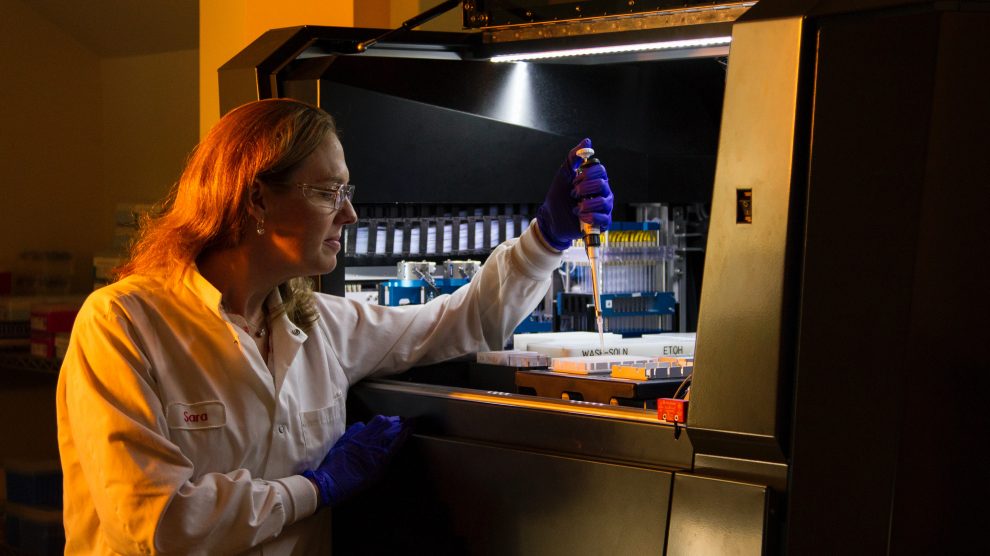BMG Labtech has served many distinguished laboratories all over the world. Most recently, its microplate readers became part of the AstraZeneca laboratory.
Biotechnology company BMG Labtech sponsored prizes for the 2021 VIIN Young Investigator Symposium. The event, organised by the Victorian Infection and Immunity Network in Australia, took place online from November 15-17.
It featured dozens of young researchers from universities all over Australia.
- Eastern Europe’s authoritarian past is no longer a valid excuse for vaccine hesitancy
- Thinking global from the get go: Boosting healthtech in Europe’s emerging regions
- How a new EIT hub in Budapest can support more innovation in Central and Eastern Europe
BMG Labtech awarded the best student or RA oral presentation to Gemma Hartley from Monash University. Her study on “Durability of B-cell memory to SARS-CoV-2 infection and vaccination” received high praise.
There were two runners-up for the award. Osezua Oseghale from RMIT University was one of them for her study on the influenza A virus.
University of Melbourne’s Dionne Argyropoulos was the other runner-up. She conducted molecular surveillance of asymptomatic Plasmodium falciparum in high-transmission regions.
Presentation topics ranged across various fields under biology and biotechnology. Aside from the student presenters, industry leaders were also in attendance. The symposium was an avenue for networking, career development, and scientific exchange.
Ongoing support
BMG Labtech isn’t new to the university research scene. Throughout the business’ three-decade history, they have supported the academe and student researchers.
In 2019, the biotech firm supported six teams across the two competitions iGEM and BIOMOD. These are highly-regarded genetic engineering and biomolecular design competitions in their respective fields.
The company supplied three iGEM teams with training on their microplate readers. They met with the students and helped with equipment settings and results analysis. These three teams were from the University of Nottingham, the University of Manchester, and the University of Oxford, UK.
For the University of Potsdam, Germany team, BMG Labtech supplied a SPECTROstar Nano microplate reader. Their new piece of equipment also came with additional training.
The company provided the French iGEM team with filters for their measurements. They attended the University of Nantes.
There was only one team for BIOMOD that BMG Labtech supported at the time. They were the pioneering BIOMOD team for Imperial College London. The company gave them the loan of a FLUOstar Omega microplate reader with added training.
Consistent with their support for the community, the firm continues its academic contributions. They already have several conferences lined up for next year. Scientists, educators, and students will all be in attendance.
Industry staple
In its 30 years, BMG Labtech’s microplate readers have been an industry staple.
Just last year, they received awards for outstanding product reviews on SelectScience. The PHERAstar FSX High-Throughput Screening (HTS) microplate reader and the CLARIOstar Plus multi-mode microplate reader both received a Seal of Quality.
This award was the result of consistent positive feedback from scientists worldwide.
“All of us at BMG Labtech are elated to receive the Bronze Seal of Quality for our two premium microplate readers. It’s a testament to the hard work that goes into constantly developing unique technologies to provide scientists with the very best equipment for their work,” said Tobias Pusterla, the current international marketing manager at BMG Labtech.
Seals of Quality are highly coveted awards in the community. SelectScience is the leading lab tech platform for scientists and their peers. Also, they only award this to the top 0.1 per cent of products on their platform.
BMG Labtech has served many distinguished laboratories all over the world. Most recently, its microplate readers became part of the AstraZeneca laboratory.
“We have a broad range of experiences to draw from and set a high bar on what we needed from the next generation of readers. In our trials, we found that the improvements in the new PHERAstar FSX outperformed our historic experiences and the other readers in our trial,” said Mark Wigglesworth, AstraZeneca’s director of high throughput screening.
“The reader has fitted well into our assay development and screening groups, where it has been used frequently for a variety of technologies,” he added.
Unlike many news and information platforms, Emerging Europe is free to read, and always will be. There is no paywall here. We are independent, not affiliated with nor representing any political party or business organisation. We want the very best for emerging Europe, nothing more, nothing less. Your support will help us continue to spread the word about this amazing region.
You can contribute here. Thank you.



